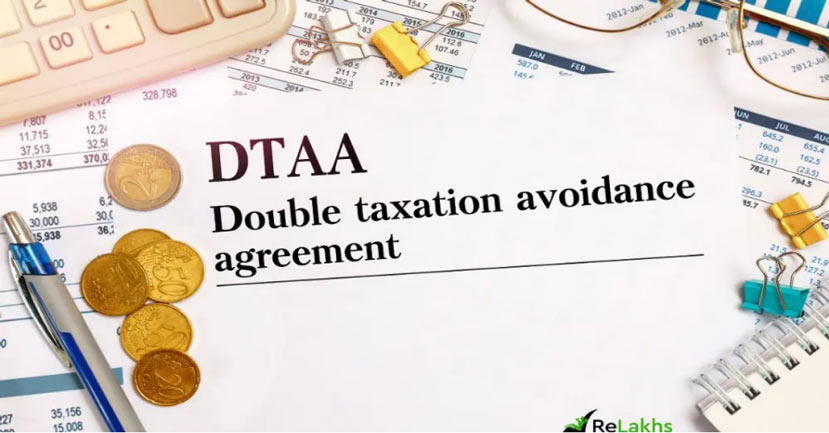All About Double Taxation Avoidance Agreement
Triston Martin
Jan 08, 2024
If you are an international investor, understanding the fundamentals of a double taxation avoidance agreement (DTAA) is essential to protect yourself from legal implications. This blog post will look at DTAA and how it works and provide a step-by-step guide to navigating double taxation agreements in different countries.
You'll also find resources for further exploration and advice on choosing a jurisdiction that best fits your needs. Investing abroad can be lucrative, but there could be costly consequences without knowledge about double taxation agreements. By reading this comprehensive guide today, equip yourself with all the tools needed to make well-informed decisions when investing across borders!
Understand the Double Taxation Avoidance Agreement (DTAA)
A Double Taxation Avoidance Agreement (DTAA) is an international agreement to prevent double taxation of income earned by individuals or entities in different countries. It does this through a set of rules which aim to ensure that the same income is not taxed twice – once in the country where it was earned and again when sent back home. In addition to preventing double taxation, DTAA also establishes procedures for repatriating investments, provides information exchange between countries, and reduces tax avoidance by multinationals.
DTAAs are negotiated between two or more countries as part of bilateral agreements or multilateral conventions. Each DTAA sets out how certain types of income will be taxed if it crosses borders; for example, dividends might be taxed at a lower rate to encourage foreign investment. Typically, the agreement sets out how income will be apportioned between countries according to the source of the income (e.g., where it was earned) and the residence of the person or entity receiving it.
Benefits of Double Taxation Avoidance Agreement (DTAA)
1. Prevents Double Taxation of Income
The key benefit of a DTAA is that it prevents double taxation of income earned by individuals or companies in different countries.
2. Establishes Repatriation Procedures
DTAAs also establish procedures for repatriating investments, such as dividends, interest, and royalties.
3. Avoids Tax Avoidance by Multinationals
Double taxation agreements help to reduce tax avoidance by multinationals, who may attempt to shift profits to lower-tax jurisdictions.
4. Encourages Foreign Investment
Many DTAAs contain provisions that encourage foreign direct investment (FDI). For example, they often contain preferential rates for dividend income, which can attract investors from abroad.
5. Reduces Compliance Costs
DTAA can reduce compliance costs for businesses operating in multiple countries by providing a set of rules to follow.
6. Makes Tax Planning Easier
The rules under a double taxation agreement make tax planning easier, as the same income is not taxed twice.
7. Encourages Trade and Investment between Countries
Double taxation agreements help to encourage trade and investment between countries by providing certainty over how income will be taxed.
8. Enhances Transparency & Exchange of Information
DTAA helps to increase transparency between countries by requiring exchanges of information on financial activity and tax avoidance measures.
9. Prevents Tax Discrimination
A double taxation agreement ensures that taxpayers are treated equally regardless of whether they operate in their own or another country's jurisdiction.
10. Facilitates Tax Dispute Resolution
DTAAs can resolve disputes over how income should be taxed, reducing the cost and time needed to settle disagreements.
11. Reduces Tax Evasion
DTAA reduces the potential for tax evasion by providing greater transparency and information exchange between countries. This helps governments ensure that taxpayers pay their taxes.
List of Documents Required for Claiming DTAA Benefits
1. Passport
A valid passport of both the taxpayers (resident of one country and non-resident in the other) must be submitted.
2. PAN Card

A PAN card must be furnished as proof of identity while claiming DTAA benefits.
3. Tax Residency Certificate: A tax residency certificate from your country should also be provided for claiming the DTAA benefits.
4. Bank Statements
Bank statements may also need to be produced, depending on the specific agreement terms between countries involved in double taxation avoidance agreements.
5. Other Financial Documents
Depending on your circumstances, other financial documents, such as rental receipts or sale agreements, might need to be shown when claiming DTAA benefits.
Navigating double taxation agreements in different countries can be complicated, so it is important to seek the advice of an experienced professional. An informed understanding of DTAA will help you make the most of the tax breaks available and ensure that you comply with international regulations.
Investing abroad can be profitable, but knowledge about double taxation agreements is necessary to avoid costly consequences. Make sure you have a comprehensive understanding of how these agreements work before doing business overseas.
DTAA Rates
The rates of taxation under DTAA vary between countries and agreements. Generally, the tax rate imposed on income earned in another country will be lower than the rate levied within one's own country. As such, it is possible to save money by taking advantage of the reduced taxes offered through DTAA.
In addition to differing Rates, double taxation avoidance agreements can also contain provisions relating to capital gains tax, withholding tax, inheritance tax, and more. It's important to carefully research your specific agreement before investing abroad to ensure you know all rules and regulations applicable to your situation.
List of 25 Countries Who Signed the Double Taxation Avoidance Agreement
1. India
2. The United States
3. Canada
4. Australia
5. New Zealand
6. South Africa
7. Hong Kong
8. Singapore
9. China
10. Japan
11. Thailand
12. Germany
13. The Netherlands
14. France
15. Cyprus
16. Ireland
17. United Kingdom
18. Finland
19. Sweden
20. Spain
21. Italy
22. Denmark
23. Norway
24. Austria
25 Portugal
It is important to note that the list of countries mentioned above that have signed double taxation avoidance agreements needs to be completed and may differ depending on the agreement terms between countries involved in double taxation agreements.
Furthermore, different DTAAs have different rules that must be followed when investing abroad to ensure compliance with international regulations and maximize tax savings opportunities. As such, it is always best practice to consult a professional before engaging in any cross-border investment activity.
FAQs
Q: How do I know if a jurisdiction has a double taxation agreement?
A: You can find out information about existing double taxation agreements by checking the website of the relevant tax authorities. Alternatively, you can contact a professional tax advisor who can advise you on the best jurisdiction to invest in based on your specific needs.
Q: What should I consider when choosing a double taxation agreement?
A: When selecting a DTAA, it is important to consider the tax rates and other factors, such as currency stability and compliance requirements. Countries have different laws and regulations that could affect how much taxes you will pay or whether certain types of income are taxable. Additionally, if you need to repatriate profits or funds from one country to another, it's important to understand any restrictions between them.
Q: Where can I find more information about double taxation agreements?
A: You can find comprehensive information about double taxation avoidance agreements on websites like the OECD and World Bank. Additionally, professional tax advisors are a great source of advice and help understand DTAA in different countries. They can provide tailored advice based on your needs and objectives.
Conclusion
Double taxation avoidance agreements provide a framework for optimizing and compliantly navigating international investments. With the right knowledge, these agreements offer investors a range of benefits, from reduced tax liabilities to increased transparency and information exchange between countries. It is important to familiarize yourself with all aspects of double taxation agreements before investing abroad to ensure you make the most of these beneficial arrangements while staying within regulatory boundaries.








